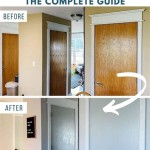Can You Soundproof Interior Walls?
Interior walls play a crucial role in maintaining privacy and minimizing noise levels within a home or building. However, sound can easily penetrate these walls, resulting in unwanted noise transmission. If you're seeking ways to improve soundproofing in your interior walls, this article will guide you through the essential aspects and effective techniques.
Understanding Soundproofing
Soundproofing involves reducing the transmission of sound waves through walls and other surfaces. Sound waves travel through materials, causing them to vibrate and emit noise. By implementing various soundproofing methods, you can effectively dampen these vibrations and minimize noise levels.
Mass and Thickness
One of the most fundamental principles of soundproofing is increasing the mass and thickness of the wall. Adding mass to a wall makes it more difficult for sound waves to penetrate, while thicker walls provide a greater distance for sound waves to travel before reaching the other side.
Damping Materials
Damping materials, such as fiberglass insulation or soundproofing mats, are placed within wall cavities to absorb sound waves and reduce their energy. These materials dissipate sound energy as heat, effectively preventing it from passing through the wall.
Acoustic Caulking and Sealants
Even small gaps and cracks in walls can allow sound to leak through. Acoustic caulking and sealants are specifically designed to fill these openings and create a tight seal, preventing sound transmission.
Soundproofing Membranes
Soundproofing membranes are thin, flexible materials that can be installed on walls to reflect and absorb sound waves. These membranes are often used in combination with other soundproofing techniques to enhance their effectiveness.
Wall Decoupling
Wall decoupling involves separating the wall from the framing to prevent sound from traveling through the structure. This can be achieved using resilient channels or isolation clips that create a physical barrier between the wall and the framing.
Other Considerations
In addition to the techniques mentioned above, other factors can influence soundproofing effectiveness. These include the type of wall construction, the presence of windows and doors, and the surrounding environment. Consulting with an acoustic expert can help determine the best combination of soundproofing methods for your specific needs.
Conclusion
Soundproofing interior walls is an effective way to improve privacy, reduce noise levels, and create a more comfortable living environment. By understanding the principles of soundproofing and implementing appropriate techniques, you can significantly minimize sound transmission and enjoy a quieter and more peaceful space.

How To Soundproof A Wall Materials For Soundproofing Walls

Wall Soundproofing How To Soundproof Your Netwell

Wall Soundproofing How To Soundproof Your Netwell

How To Soundproof A Wall Achieve Higher Stcs On Your Demising

Soundproofing Your Apartment The Myths What You Can Do

Acousticlip Stud Wall Soundproofing System Noisestop

Soundproofing How To Soundproof A Room Diy Project The Family Handyman

How To Soundproof A Wall Achieve Higher Stcs On Your Demising

Wall Soundproofing How To Soundproof Your Netwell

Soundproofing How To Soundproof A Room Diy Project The Family Handyman
Related Posts








